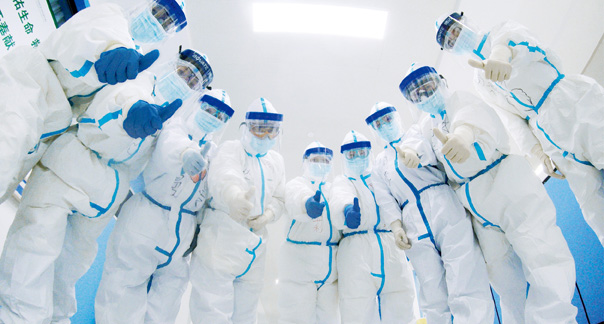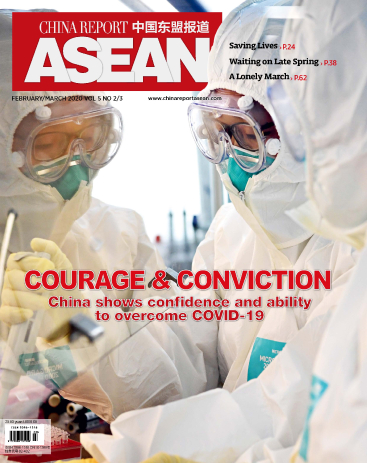Huazhong University of Science and Technology (HUST) in Wuhan, capital of central China's Hubei Province, has been in the spotlight as a major battlefield for the fight against the novel coronavirus.
HUST is a leading comprehensive university under the administration of the Ministry of Education. It is the university that has devoted the largest number of hospital beds and the most medical workers to the fight against the virus, said Shao Xinyu, chief of the Communist Party of China Committee of HUST, on February 21, in an interview with China Central Television.
Experts in public health and preventive medicine, a leading subject at HUST, have made great contributions to combating the virus, providing professional suggestions to central and local governments regarding epidemic analysis, prevention and control measures and scientific popularization.
Shao said the epidemic has dealt a heavy blow to Wuhan, Hubei and the world. In the face of the epidemic, nobody can evade their responsibilities. As a university, HUST not only teaches knowledge and skills but more importantly it helps its students form correct value systems, ethical standards and humanitarian concerns, which is more important.
A Strong Fortress
All the 10 hospitals affiliated with the university have been designated to treat infected patients, providing a total of 33,000 medical workers and more than 8,900 beds.
The number of medical workers from HUST is close to the total number of medical workers sent to Wuhan from other places across the country, which stood at 38,000 as of February 22; and the beds contributed by HUST account for nearly 40 percent of all hospital beds in Wuhan available for novel coronavirus infected patients.
Of the 10 hospitals, Union and Tongji hospitals are designated for critically infected patients. Four hospitals are designated for patients from Jianghan and Qiaokou districts and Donghu Lake Scenic Area. Three hospitals are designated for infected children, pregnant women and mentally challenged people, and one hospital has taken over temporary hospitals.
Doctors in the Union Hospital are among the earliest to fight the virus. On January 20, Zhong Nanshan, a renowned respiratory scientist, announced that 14 medical workers in Wuhan were infected by the virus. All of them are from the Union Hospital.
However, the news of infection did not deter other doctors to thrust into the war. On January 27, a doctor in the Union Hospital wrote a letter applying to join the fight against the virus, “I do not care about rewards and will fight the virus even if it's at the expense of my own life.” This line has later been frequently quoted by other volunteer medical workers in their applications.
Zhu Bin, another doctor from the infectious disease department of the Union Hospital, was studying at a Shanghai hospital when the epidemic broke out. In late January, he decided to end his studies early to return to Wuhan. Since many flights and trains to Wuhan had been canceled as part of epidemic control, Zhu had to take a plane to Changsha, capital of neighboring Hunan Province, and then a taxi to Wuhan. The whole trip took him two days.
Meanwhile, these affiliated hospitals have been offering online consulting services and developing relevant diagnosis and treatment guidelines.
On January 21, Tongji Hospital formulated a quick diagnosis and treatment guideline for clinical practices in Hubei.
On January 24, the fever outpatient department of Tongji Hospital opened an online outpatient service to patients nationwide, with the number of inquiries on the first day reaching over 10,000, effectively solving patients' difficulty in seeing a doctor.
On January 26, the first nucleic acid testing laboratory for the virus in Hubei was established at the Union Hospital.
The pathology team from the Department of Forensic Medicine of Tongji Medical College has carried out postmortem exams of nine people who have died of the disease in order to find its pathogenesis and provide reference for future treatment.
The Institute of State Governance of HUST has conducted comprehensive research into the virus' prevention and control and the modernization of public health governance and proposed a series of targeted suggestions and solutions.
A Leading Medical College
Tongji Medical College of HUST is among the top medical colleges in China. It has trained many renowned doctors who are now academicians, such as hepatobiliary surgeon Chen Xiaoping with the Chinese Academy of Sciences and obstetrician and gynecologist Ma Ding, who is with the Chinese Academy of Engineering.
The college's history stretches back over 100 years and its predecessor was the German medical college established by Erich Paulun in Shanghai in 1907, which filled a gap in China's modern medical education.
The medical college was named Tongji German Medical College in 1908, with Tongji meaning working together in the same boat to overcome difficulties. In 1927, the college was renamed Tongji University, and in February 1950, it moved to Wuhan and merged with the Wuhan University Medical College to form the Central South Tongji Medical College. It was renamed Wuhan Medical College in August 1955 and Tongji Medical University in July 1985. After merging into HUST in 2000 to become its medical college, the college took over seven other special and comprehensive hospitals to increase the number of its affiliated hospitals to 10 in 2016.
Important Role
HUST was formed from a merger of Tongji Medical University, Wuhan Urban Construction College and Huazhong University of Technology in 2000.
Over the past decades, HUST and its predecessors have played important roles in mitigating major national disasters. During the schistosomiasis outbreak in the suburbs of Shanghai in 1950, the prototype of today's Tongji Medical College called on its teachers and students to go to the frontline to help prevent and control the disease.
During the great flood in Wuhan in 1954, over 1,000 people from the medical college took part in disaster relief and medical care. When a 7.8-magnitude earthquake hit Tangshan in Hebei Province in north China in 1976, 130 medical workers from Tongji rushed to the area and treated over 15,000 injured people in the course of a month.
In addition, 45 medical teams from Tongji took part in relief work in the most dangerous areas of Hubei during the 1998 Yangtze River flood.
In 2003, during the severe acute respiratory syndrome (SARS) outbreak, nearly 20 experts from the college joined various research and command centers against the virus and 12 medical workers were sent to work at the Xiaotangshan Hospital, a temporary hospital in Beijing for treating SARS patients. Medical workers from HUST affiliated hospitals also provided medical services after an 8-magnitude earthquake hit Wenchuan, Sichuan Province in southwest China, in 2008.
During the current epidemic, the college is trying its best to give frontline medical workers as much support as possible since they are totally overworked, said HUST President Li Yuanyuan.
On February 8, HUST called on its alumni around the world to help their alma mater, Wuhan and Hubei. As of February 23, over 50 HUST alumni associations, tens of thousands of alumni and many enterprises established by HUST alumni had donated materials worth over 300 million yuan (US$42.8 million) to more than 100 hospitals in Wuhan and other cities in Hubei and over 16 million yuan (US$2.28 million) of epidemic prevention fund to HUST.
In the fight against the epidemic, HUST faculty, students and alumni have shown the spirit of unity, Li said. The university has aligned its own destiny with that of the country. It has always aimed to cultivate high-caliber talent who are patriotic, dedicated and with professional skills. This is what a world class university should pursue.

Nurses from special ward for COVID-19 at the Zhongfaxincheng campus of Tongji Hospital affiliated to Huazhong University of Science and Technology in Wuhan, Hubei Province, pose for a photo on February 18.


 Copy Reference
Copy Reference